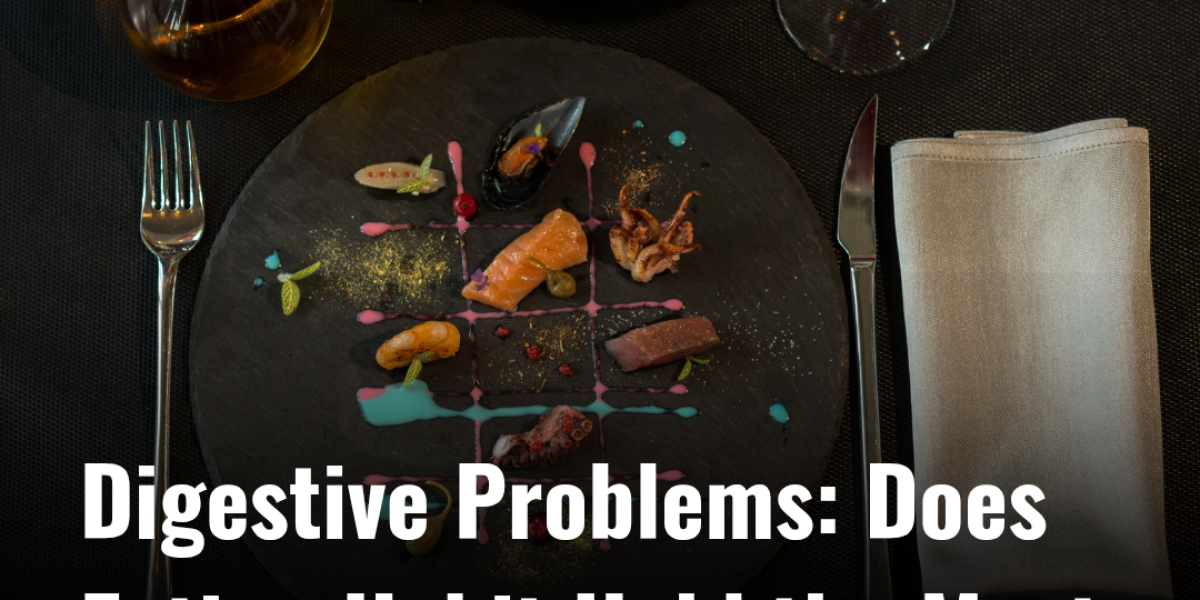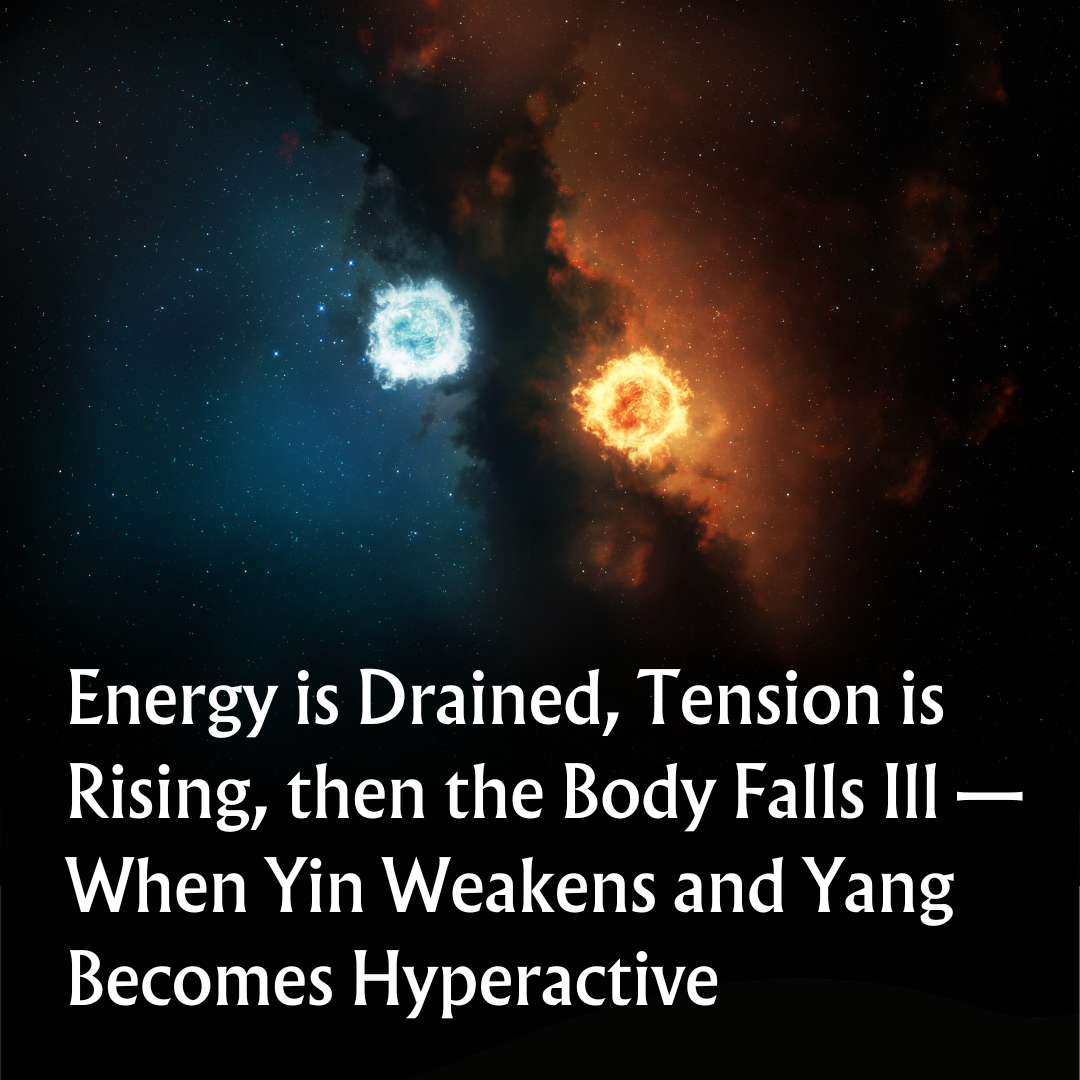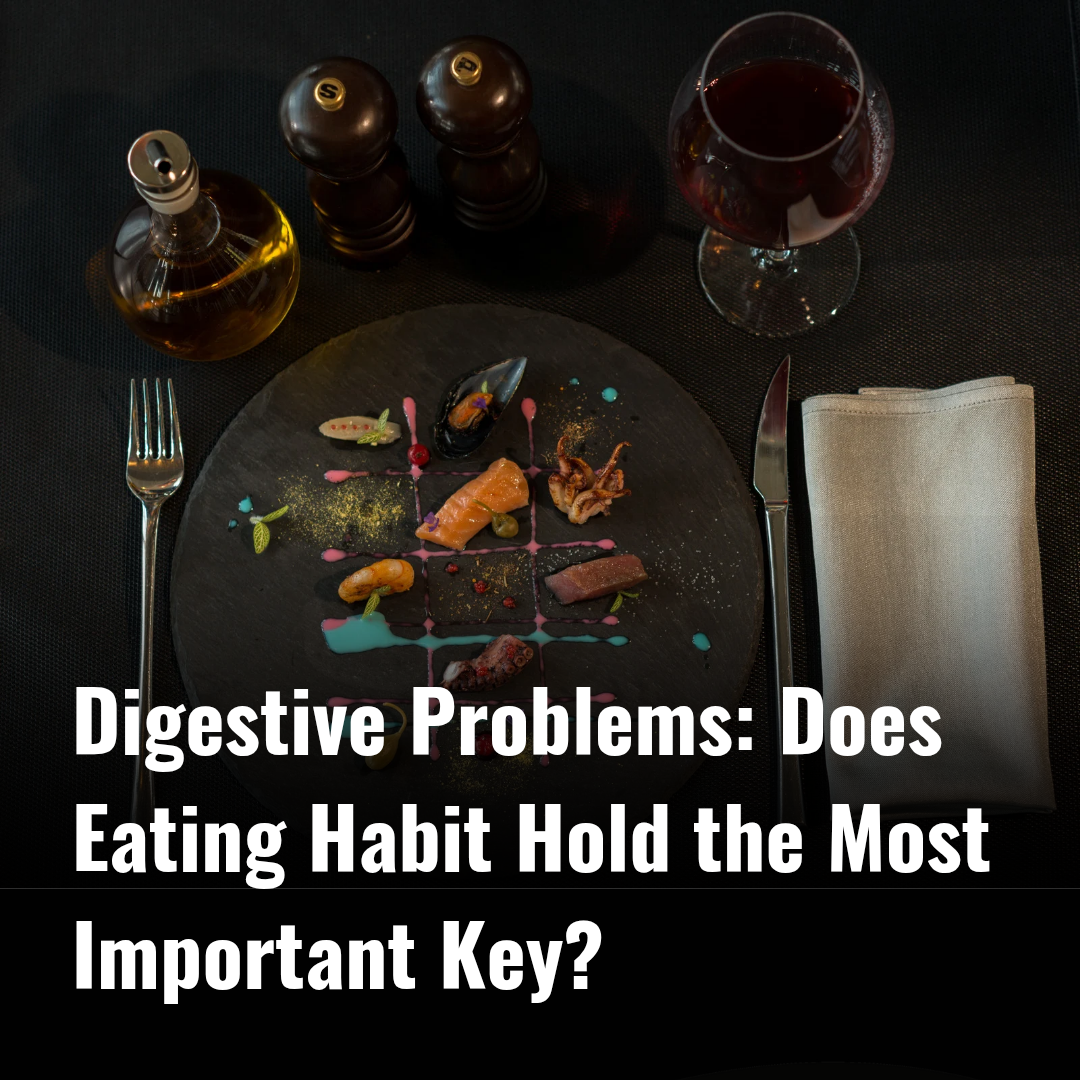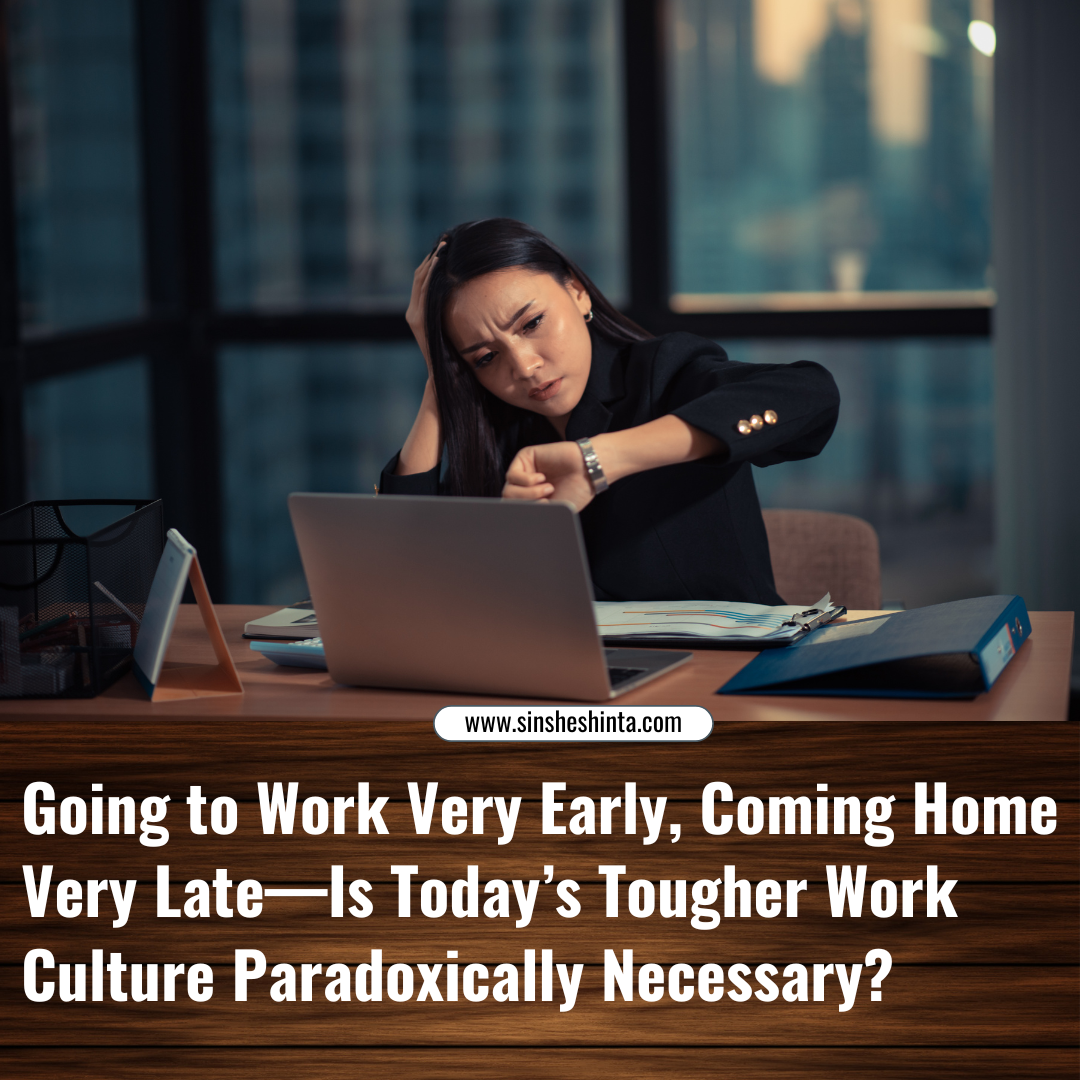Digestive Problems: Does Eating Habit Hold the Most Important Key?
Digestive problems pose a serious threat to our lives. If mismanaged, they can even lead to dangerous, life-threatening conditions—yet ironically, many people pay little attention to them.
It pains me to say this, but the truth is that many people neglect their digestive health because they persist in living a disordered lifestyle, particularly in their eating habits.
Are you not one of them? That’s wonderful—I’m genuinely glad to hear that. When we truly grasp the dangers of an undisciplined lifestyle—and in the case of digestion, a poor diet—I believe we naturally strive to avoid such risks.
Yet, disciplining oneself to maintain healthy dietary and lifestyle habits is a challenge in and of itself. Why? Because the temptation is immense. Consider the following situations:
-
You intend to eat healthy meals, but then you’re presented with dishes rich in meat, fried, grilled, fatty—and irresistibly appetizing. And to make matters worse, an ad flashes before you: “Today only! 80% off! Buy now—limited stock!”
-
You plan to eat lunch precisely at noon. But suddenly, urgent work piles up. You become so absorbed in your tasks that you forget to eat, and by the time you do, it’s already 3 p.m.
-
You’ve made a resolution to cut back drastically on caffeine and alcohol. But then a friend arrives and surprises you with a premium bottle of alcohol: “This is special—I sent it just for you!”
And so you think: “Just today. Just this once. It won’t be a habit… Why must I suffer so much by restraining myself from everything? Tomorrow, I’ll go back to being disciplined.”
Many have asked me, “Does a healthy lifestyle need to be followed strictly every single day? Will a single day of indulgence undo everything and ruin our quality of life?”
My answer is: “Will there be absolutely no consequence at all (for example, excessive coffee for someone with chronic acid reflux)? That depends on many factors: the severity of your condition, the extent of your ‘disciplinary breach’ in lifestyle or diet, and other often-overlooked influences such as natural factors (e.g., bad weather), social stressors (e.g., stressful interactions that worsen symptoms), or accidental triggers (e.g., exposure to allergens, physical trauma).”
But for those without serious conditions, if no external aggravating factors are present and you genuinely lapse just for one day, then no—major consequences likely won’t occur.
“Likely won’t”—but not “definitely won’t.” So yes, problems can still arise. And sometimes, they do. Allow me to share a personal experience.
During my university years, I fell into an unhealthy lifestyle out of sheer over-motivation to excel academically. The intention was good—but the method, regrettably, was not. I looked up to a peer who studied relentlessly. I admired her ability to remain focused without fatigue.
So, I asked her, “What’s your secret? How do you study so intensely without ever feeling sleepy?”
Her reply? You might not expect it.
“My secret? I drink six cups of coffee a day.”
Or perhaps you did expect it—because you’ve heard of this tactic, or perhaps even tried it yourself?
I was immediately intrigued. “Why hadn’t I thought of that?” I said to myself. No wonder she was always alert, while I struggled with drowsiness. Without hesitation, I began following her method.
Ironic, isn’t it? A Chinese Medicine student violating the very principles of health. But at the time, I felt desperate—I needed all the energy I could get to survive those rigorous studies.
I had never been a coffee drinker—not even one cup a day. But I began. At first, I cautiously drank just one cup, hesitant because it was new to me.
To my surprise, I thought: “This is amazing! I’m not sleepy! My eyes are wide open, and I feel more motivated than ever!”
But Chinese Medicine is a uniquely difficult subject—not only due to the language barrier (I was studying in Mandarin, which is not my native tongue), but because the system itself is intricate and demanding. Soon, one cup of coffee wasn’t enough. I increased it to two cups.
Then three.
Eventually, I reached the “six cups a day” formula.
That became my limit—enough to sustain my study stamina, but also enough to begin damaging my health.
Slowly, I began experiencing frequent pain in the epigastric region. It wasn’t consistent—sometimes it would come and go—but at its peak, the pain was debilitating. I could do nothing but lie down or sit curled up, clutching my abdomen. The pain could be brief or persist for several minutes. It was not accompanied by other symptoms like burning in the esophagus or vomiting, but I did belch frequently.
Another symptom—seemingly unrelated to digestion—was psychological: anxiety, restlessness, excessive rumination, panic, and disturbed sleep. Though I got eight hours of sleep each night, it never felt restorative. Even a full night’s rest couldn’t relieve the exhaustion.
And here is one of humanity’s great flaws: we often only abandon a harmful lifestyle after suffering its consequences.
Some might ask: “But aren’t you a Chinese Medicine practitioner? Can’t you just treat the symptoms with therapy and be fine?”
I remember one student joking during a class. When I explained the importance of lifestyle in healing, he quipped, “Most patients think, ‘Let me enjoy life first—I’ll go to the doctor when I get sick!’”
The whole class laughed—because it was funny. But it was also true.
Many patients carry this mindset. They live recklessly, seek treatment when they fall ill, recover—and then resume their bad habits, unafraid of relapse.
But can we, as practitioners, do the same? Can we afford to live carelessly, thinking we can “fix it later”?
It’s exhausting. Why? Because we trap ourselves in a vicious cycle:
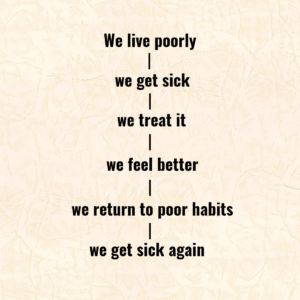
Illness is indeed an inevitable part of life. But if we can prevent it, why deliberately invite it?
Moreover, in the world of illness, healing is often a false promise. If we persist in harmful habits, recovery becomes merely a delay—one that conceals something worse. Even if the body “recovers,” the next illness may be more severe. Eventually, it reaches a point where—even after seeking the best treatments, even after sincerely vowing to change—we may not recover. The hope of healing is gone.
That is the outcome I refuse to let happen to me.
So I stopped. While the damage had not yet escalated, I cut down my coffee intake—sometimes once, occasionally twice a day, but never more. I also underwent treatment. And yes—the results were good. It helped tremendously.
But that doesn’t mean the issue never returned.
Years passed. Then came the rise of food trends on social media. “Unique” dishes began going viral. And humans—being humans—chased trends. This is the classic FOMO (Fear of Missing Out). A dish goes viral, and everyone rushes to try it. If you don’t, you feel left out—even if the food may harm your health.
Among those trends were extremely spicy foods. The kind that made you a “hero” if you could eat them. Everyone loved them. And so—I tried them.
Did it make me a hero?
No. My digestive problems came back.
Another time, the issue wasn’t spicy food—but sticky rice. It’s widely believed to be bad for digestion. But let’s clarify: many health beliefs circulate widely online, often oversimplified. (For a deeper discussion, please refer to the link provided.)
Sticky rice does have a heavier texture, which may feel burdensome for some people. But to say it’s generally bad for digestion is misleading. For healthy individuals, it can be part of a balanced diet. It’s more accurate to say: sticky rice has different digestive properties and should be consumed according to one’s condition.
For someone like me, with a history of digestive issues—it became a trigger. My symptoms returned.
Thankfully, due to the discipline I had cultivated earlier—especially in diet—I was able to recover swiftly, within hours.
But only because I stopped immediately. I didn’t say: “It’s okay to cheat once in a while!” Even if I wanted to indulge, I always calculated the risk.
And honestly—it was hard. It was tiring.
In retrospect, it would have been better never to break the rules at all, haha.
Disclaimer:
The content of this article is intended for informational and reflective purposes only. It does not constitute medical advice, diagnosis, or treatment, and should not be used as a substitute for professional healthcare guidance. The personal experiences and perspectives shared are illustrative and do not apply universally. Readers are encouraged to consult with qualified medical professionals or healthcare practitioners regarding any health-related concerns or lifestyle changes. The author disclaims any liability for decisions made based on the content of this article.
References:
- Englyst, H. N., Kingman, S. M., & Cummings, J. H. (1992). Classification and measurement of nutritionally important starch fractions. European Journal of Clinical Nutrition, 46(Suppl 2), S33–S50.
- Koo, J. C., Lee, B. H., Lee, S. K., & Lee, S. (2018). Effect of physicochemical properties of glutinous rice on glycemic index and in vitro starch digestibility. Journal of Cereal Science, 83, 115–121. https://doi.org/10.1016/j.jcs.2018.08.006
- Sopade, P. A., & Gidley, M. J. (2009). A dynamic model for the kinetics of starch digestion in vitro. Carbohydrate Polymers, 76(4), 629–637. https://doi.org/10.1016/j.carbpol.2008.11.016

